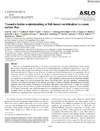Identificador persistente para citar o vincular este elemento:
https://accedacris.ulpgc.es/jspui/handle/10553/107238
| Título: | Toward a better understanding of fish‐based contribution to ocean carbon flux | Autores/as: | Saba, Grace K. Burd, Adrian B. Dunne, John P. Hernández León, Santiago Manuel Martin, Angela H. Rose, Kenneth A. Salisbury, Joseph Steinberg, Deborah K. Trueman, Clive N. Wilson, Rod W. Wilson, Stephanie E. |
Clasificación UNESCO: | 251001 Oceanografía biológica | Fecha de publicación: | 2021 | Proyectos: | Sustainable management of mesopelagic resources Tropical and South Atlantic - climate-based marine ecosystem prediction for sustainable management |
Publicación seriada: | Limnology and Oceanography | Resumen: | Fishes are the dominant vertebrates in the ocean, yet we know little of their contribution to carbon export flux at regional to global scales. We synthesize the existing information on fish-based carbon flux in coastal and pelagic waters, identify gaps and challenges in measuring this flux and approaches to address them, and recommend research priorities. Based on our synthesis of passive (fecal pellet sinking) and active (migratory) flux of fishes, we estimated that fishes contribute an average ( standard deviation) of about 16.1% ( 13%) to totalcarbon flux out of the euphotic zone. Using the mean value of model-generated global carbon flux estimates, this equates to an annual flux of 1.5 1.2 Pg C yr−1 . High variability in estimations of the fish-based contribution to total carbon flux among previous field studies and reported here highlight significant methodological variations and observational gaps in our present knowledge. Community-adopted methodological standards, improved and more frequent measurements of biomass and passive and active fluxes of fishes, and stronger linkages between observations and models will decrease uncertainty, increase our confidence in the estimation of fish-based carbon flux, and enable identification of controlling factors to account for spatial and temporal variability. Better constraints on this key component of the biological pump will provide a baseline for understanding how ongoing climate change and harvest will affect the role fishes play in carbon flux. | URI: | https://accedacris.ulpgc.es/handle/10553/107238 | ISSN: | 0024-3590 | DOI: | 10.1002/lno.11709 | Fuente: | Limnology and Oceanography [ISSN 0024-3590], v. 66(5), p. 1639-1664, (Mayo 2021) |
| Colección: | Artículos |
Citas de WEB OF SCIENCETM
Citations
160
actualizado el 22-feb-2026
Visitas
78
actualizado el 10-ene-2026
Descargas
67
actualizado el 10-ene-2026
Google ScholarTM
Verifica
Altmetric
Comparte
Exporta metadatos
Los elementos en ULPGC accedaCRIS están protegidos por derechos de autor con todos los derechos reservados, a menos que se indique lo contrario.
